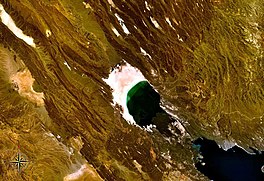| Lake Assal | |
|---|---|
| Lac Assal بحيرة عسل | |
 | |
| Location | Tadjourah Region |
| Coordinates | 11°39′N 42°25′E / 11.650°N 42.417°E |
| Type | Crater Hypersaline |
| Primary inflows | Subsurface from the ocean |
| Primary outflows | Evaporation |
| Catchment area | 900 km2 (350 sq mi) |
| Basin countries | Djibouti |
| Max. length | 19 km (12 mi) |
| Max. width | 6.5 km (4.0 mi) |
| Surface area | 54 km2 (21 sq mi) |
| Average depth | 7.4 m (24 ft) |
| Max. depth | > 40 m (130 ft) |
| Water volume | 400 million cubic metres (320,000 acre⋅ft) |
| Surface elevation | −155 m (−509 ft) |
| Settlements | Randa (25 km or 16 mi northeast) |
Lake Assal (Arabic: بحيرة عسل Buḥayrah ʿAsal, lit. “Honey Lake”) is a crater lake in central-western Djibouti. It is located at the western end of Gulf of Tadjoura between Arta Region, and Tadjoura Region, touching Dikhil Region, at the top of the Great Rift Valley, some 120 km (75 mi) west of Djibouti city. Lake Assal is a saline lake that lies 155 m (509 ft) below sea level in the Afar Triangle, making it the lowest point on land in Africa and the third-lowest point on Earth after the Sea of Galilee and the Dead Sea. No outflow occurs from the lake, and due to high evaporation, the salinity level of its waters is 10 times that of the sea, making it the fifth most saline body of water in the world, behind Garabogazköl, Lake Retba, and Gaet'ale Pond.[1][2][3][4][5] The salt in the lake is exploited under four concessions awarded in 2002 at the southeast end of the lake; the major share of production (nearly 80%) is held by Société d’Exploitation du Lac and Société d’Exploitation du Salt Investment S.A de Djibouti.[5]
The lake is a protected zone under Djibouti's National Environmental Action Plan of 2000. However, the law does not define the boundary limits of the lake. Since the exploitation of the salt from the lake was uncontrolled, the Plan has emphasized the need for managing the exploitation to avoid negative impact on the lake environment. The Government of Djibouti has initiated a proposal with UNESCO to declare the Lake Assal zone and the Ardoukoba volcano as a World Heritage Site.[5][6]
- ^ Warren, John K. (23 February 2006). Evaporites: sediments, resources and hydrocarbons. Birkhäuser. p. 280. ISBN 978-3-540-26011-0. Retrieved 27 May 2011.
- ^ "Lake Assal". Encylopeadeia Britannica. Retrieved 25 May 2011.
- ^ "Lake Assal – Djibouti". British Broadcasting Corporation (BBC). Retrieved 25 May 2011.
- ^ "A life of constant thirst beside Djibouti's Lake Assal". British Broadcasting Corporation (BBC). 4 December 2010. Retrieved 25 May 2011.
- ^ a b c "Lake Salt Project, Djibouti:Environmental Impact Assessment" (PDF). Government of Djibouti:Salt Investment S.A.Z.F. November 2008. pp. 1–xii, 29. Archived from the original (PDF) on 24 March 2012. Retrieved 25 May 2011.
- ^ "Geothermal Development in the Assal Area in Djibouti" (PDF). Djibouti Environmental Management Plan. pp. i–xi, 26, 29–30. Archived from the original (PDF) on 15 February 2010. Retrieved 25 May 2011.
